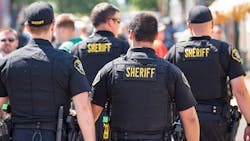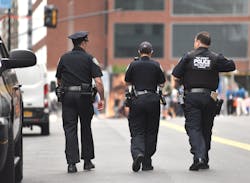The Ethos
I keep reading in leadership books of the ‘ethos’ of a vocation. Most refer to this as the spirit of that particular vocation’s culture. It can be dated with an era such as the professional model, traditional model, COP or whatever; how about “back in my day.” This can also be related to a specific community (retired or incumbents) as expressed in its beliefs and aspirations. Another community variation would be the groups of city cops, troopers or sheriffs—each similar but very different. What are our beliefs and how have they changed? It has always been the foundation of service to the community or mankind. That has not changed and never will. Even when critics accuse cops of laying down or allowing their own form of “de-policing” to exist, when that time comes—we still respond to the call! Countless acts of service and bravery still are documented, therefore deep down our ethos is intact. I remind you all of the Metro-Nashville officers’ actions during the downtown Nashville bombing. They ran into danger.
Of course, at every FOP meeting, retiree meeting or sadly at funerals, there are the old officers who create their own narrative of how they were the only “real coppers.” Like they are referring to some magical time reminiscent of “Brigadoon.” They are wrong. The current generation serving has more on their plate than we did. They have more equipment and skill-sets to master than we did. They have far more issues to balance. They live under the microscope of the 24-hour news phenomena; fueled by cellphone cameras, citizen news reporters and critics everywhere. I have full confidence with the current starting lineup. Sit back and tell stories, but do not diminish the current team—this current starting lineup is intact.
Traditions-Communications
There is always a small moment in your life that will create a great change in a life. There is a binding oath that yesterday’s officers (those of us with gray in our hair) need to be the guardians at the gate for maintaining our traditions. Our traditions speak of the long line of officers who have come before us; they exist for reasons and have meanings. I am always reflective, if not choked up during the badge pinning ceremony as your loved one or mentor is there pinning this shiny shield on your chest. I use the word “shield” with no disrespect to those who wear stars or badges. They want this item to shield your heart and protect you. Veteran officers need to be there to extend their hand with encouragement. Also, remind them that if they want to be the senior officer overseeing ceremonies like this in the future, it is up to them not to allow that shield to tarnish. Teach integrity.
I do not care the color of your uniform, shape of the shield and how colorful your patches. We are all the same, with the same mission—service. Do not be the grumpy old cop that extols the good old days with their past exploits and muddies the waters. I have observed senior officers that used landmarks from yesteryear to give directions, only to exclude the new officers. They will quote antiquated policies and laws; this is what we used to do. Use obsolete terms when talking to rookies to further confuse them. The young officer needs to know what to do—now! They want to be a part of the team and not ostracized. I would advise that some antiquated stories may violate today’s departmental policies, if not shock the conscience. It is important that we do not squander time and learning moments by frustrating them at that moment. Be that change agent! Albert Einstein was quoted in a similar way, “I speak to everyone in the same way, whether he is the garbage man or the president of the university.” Speak accurately and precisely in the line of duty. We never know when the next day will bring immense demands on our department: could be an active shooter event, bombing or natural disaster—so do not waste time or create confusion. Be the one with answers and direction. Save the war stories for after-hours comradery.
What is your ethos?
When I was lecturing executive-level courses, I made an observation. With a room full of chiefs, sheriffs and senior staffers, it was a choking atmosphere of who has the biggest department, fleet or whatever. Recently, I listened to a retried U.S. Army general speak at a local event. He asked that his resume not be given. Just his name, rank and that he was honorably retired; that’s all. When asked why, his reply was “resumes are designed to impress your mother. She is not here.” I only wish I had this quote back when I was choking in the chief’s classroom atmosphere.
Most every instructor has an ice-breaker exercise of some sort to loosen up the class. The one I want to speak about is where the student next to you has to interview you and then introduce you to the class. Most all of us have suffered through this drill. I think everyone’s ethos is how they want to be remembered, not how many cases you investigated nor your sports/hobby interests. The one question I add is to get them focused is” ‘How would you like for your epitaph to read?” If there was any pushback for this question, I would add: “Who would you want to write your epitaph?” This usually worries if not shakes them. For their doppelgangers of today may not be by their deathbed for this task. So, what few words on your tombstone would describe you for those wandering past your grave? Few words, no resume, no vita and no color photography, just a phrase. This is where the room would get somber. What will your ethos stimulate others to say about you? In wrapping up this block of instruction, I reminded them that your story is one of change. There have been good days, there will be bad days and days you recover and move forward. It is not what we endured but how we survived it and what we did with those life lessons.
To me, ethos is also transferring lessons learned for the future to learn from. The old maxim of you do not plant a tree today for shade tomorrow. You plant a tree today to provide shade for your grandchildren. The ethos takeaway here is, you share your life experience to provide guidance for the future generation. It is my hope that some of my shared life learning experiences will make a difference for an officer that has not yet been hired. Looking to the future with hope.
About the Author

William L. Harvey
Chief
William L. "Bill" Harvey is a U.S. Army Military Police Corps veteran. He has a BA in criminology from St. Leo University and is a graduate of the Southern Police Institute of the University of Louisville (103rd AOC). Harvey served for over 23 years with the Savannah (GA) Police Department in field operations, investigations and completed his career as the director of training. Served as the chief of police of the Lebanon City Police Dept (PA) for over seven years and then ten years as Chief of Police for the Ephrata Police Dept (PA). In retirement he continues to publish for professional periodicals and train.

